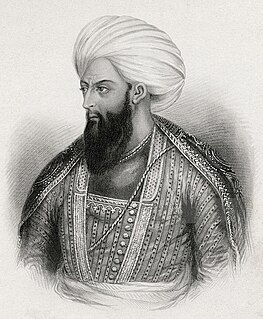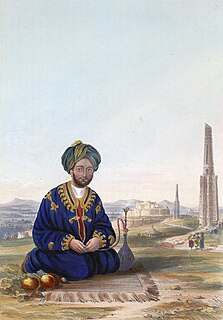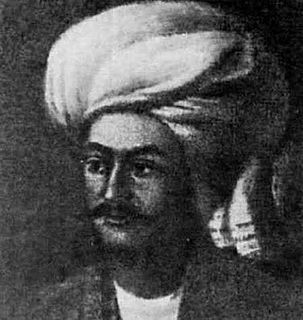Related Research Articles

European influence in Afghanistan has been present in the country since the Victorian era, when the competing imperial powers of Britain and Russia contested for control over Afghanistan as part of the Great Game.

Herāt is the third-largest city of Afghanistan. In 2020, it had an estimated population of 574,276, and serves as the capital of Herat Province, situated in the fertile valley of the Hari River in the western part of the country. It is linked with Kandahar, Kabul and Mazar-i-Sharif via Highway 1 or the ring road. It is further linked to the city of Mashhad in neighboring Iran through the border town of Islam Qala, and to Mary in Turkmenistan to the north through the border town of Torghundi.

Mohammad Ismail Khan is an Afghan politician, who served as Minister of Energy and Water from 2005 to 2013. He was previously the governor of Herat Province. He is widely known as a warlord because of his rise to power during the Soviet–Afghan War when he controlled a large mujahideen force, mainly his fellow Tajiks from western Afghanistan. He is a key member of the political party Jamiat-e Islami and was a member of the now defunct United National Front party.

Herat is one of the thirty-four provinces of Afghanistan, located in the north-western part of the country. Together with Badghis, Farah, and Ghor provinces, it makes up the north-western region of Afghanistan. Its primary city and administrative capital is Herat City. The province of Herat is divided into about 17 districts and contains over 1,000 villages. It has a population of about 2,187,169, making it the second most populated province in Afghanistan behind Kabul Province. The population is multi-ethnic but largely Persian-speaking.

Emir Dost Mohammad Khan Barakzai was the founder of the Barakzai dynasty and one of the prominent rulers of Afghanistan during the First Anglo-Afghan War. With the decline of the Durrani dynasty, he became the Emir of Afghanistan in 1823. He was the 11th son of Payendah Khan, chief of the Barakzai Pashtuns, who was killed in 1799 by King Zaman Shah Durrani. At the beginning of his rule, the Afghans lost their former stronghold of Peshawar Valley in March 1823 to the Sikh Khalsa Army of Ranjit Singh at the Battle of Nowshera. The Afghan forces in the battle were led by Azim Khan, half-brother of Dost Mohammad Khan.
This index list around 14% of all Afghanistan-related articles on Wikipedia.

Kabul University (KU) is one of the major and oldest institutions of higher education in Afghanistan. It is in the 3rd District of the capital Kabul, near the Ministry of Higher Education. It was founded in 1931 during the government of Mohammed Nadir Shah and then Prime Minister Mohammad Hashim Khan.

Mohan Lal Zutshi KLS was an Indian traveler, diplomat, and author. He played a central role in the First Anglo-Afghan War of 1838–1842. His biography of Dost Mohammad Khan, the Emir of Afghanistan in Kabul, is a primary source on the war.

The culture of Afghanistan has persisted for over three millennia, tracing record to at least the time of the Achaemenid Empire in 500 BCE. Afghanistan translates to "Land of the Afghans" or "Place of Afghans" in the nation's official languages, Dari also known as Afghan Persian and Pashto. It is mostly a tribal society with different regions of the country having its own subculture. Nearly all Afghans follow Islamic traditions, celebrate the same holidays, dress the same, consume the same food, listen to the same music and are multi-lingual to a certain extent.

Akram Yari was a Maoist political organizer in Afghanistan. He was the leader and founder of the Progressive Youth Organization (PYO), a Maoist organization which was formed on October 6, 1965.

Colonel General Abdul Kadir Dagarwal, was an Afghan politician, diplomat, and a military officer in the Afghan Air Force who participated in the coup d'état that created the Republic of Afghanistan under the President Dawood Khan, and later directed the Afghan Air Force and Army Air Corps squadrons that attacked the Radio-TV station during the Saur Revolution. He served as the acting leader of the country for three days when the People's Democratic Party of Afghanistan (PDPA) took power and declared the foundation of the Democratic Republic of Afghanistan, before handing over power to PDPA leader Noor Mohammad Taraki. He later served two terms as Minister of Defense, the first as part of the Taraki government from April to August 1978, and the latter as part of the Babrak Karmal government from 1982 to 1986. His second term took place during the Soviet war in Afghanistan.

Ghulam Haidar Khan High School is an all-boys school located in Khair Khana, Kabul, Afghanistan. The school is named after Afghan Prince Ghulam Haidar Khan, son of Emir Dost Mohammad Khan, who fought against the British forces in the July 1839 Battle of Ghazni during the First Anglo-Afghan War. It has about 10,000 students from seven to twelfth grade in four shifts.
The following lists events that happened during 2004 in Afghanistan.
Al Haj Eng Economist Mohammad Hashem Taufiqui was one of the candidates in the presidential election of 2009 in Afghanistan. Mohammad Hashem Taufiqui is an economist who has fulfilled different posts in the previous states of Afghanistan. He is an admirer of Mohammed Daoud Khan, the first president of the republic of Afghanistan. His goal is to use Khan's industrial models to develop the industry in Afghanistan. Taufiqui has also had an important role in the drawing of these models during the presidency of Mohammed Daud Khan. Under Mohammad Hashim Taufiqui's leadership, agricultural production increased from 20 thousand tons to 160 thousand tons.

Jan Prosper Witkiewicz was a Lithuanian orientalist, explorer and diplomat in Russian service. He was a Russian agent in Kabul just before the First Anglo-Afghan War.

Afghanistan–United Kingdom relations refer to bilateral relations between Islamic Republic of Afghanistan and United Kingdom of Great Britain and Northern Ireland. There has been an Afghan embassy in London since 1922 though there was no accredited Afghan ambassador from 1981 to 2001.
Karim Shah Khan was a prominent Afghan painter.

Nasrollah Sarvari was an Afghan painter. His works often deal with historical, philosophical, natural landscapes, and the social life of the villagers. He was familiar with the styles of Romanticism, Realism and Classicism and was a follower of Behzad Heravi's style in miniature art.
Gholam Mohammad Maimangi was a prominent Afghan painter.
References
- ↑ "Master Khair Mohammad KhanYari". Afghanpedia.
- ↑ "Ustad Yari". Afghan German Online.
- ↑ "Nasrollah Sarvari". Sar News (in Persian).
- ↑ "The Azure Road". Iranian Students News Agency (in Persian). 6 July 2019.